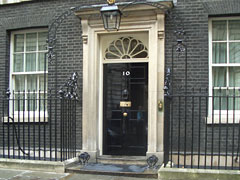Expose BAE-Saudi dirty deals
By Dominic Moran for ISN
The British government is circling the wagons as it moves to stymie calls for the resumption of a Serious Fraud Office (SFO) probe into controversial arms sales to Saudi Arabia, which the High Court found last week had been improperly scuppered under official pressure.
On Friday, Prime Minister Gordon Brown reportedly won the backing of the Conservative party for legislative moves to prevent the revival of the SFO investigation and the future formation of similar investigations.
The move comes after the High Court released a damning indictment Thursday on the Blair government's December 2006 decision to halt the SFO investigation into the US$85 billion Al Yamamah deals.
The inquiry, which followed an embargoed National Audit Office (NAO) report, was looking into corruption allegations relating to initial purchases in a series of Anglo-Saudi military deals from 1985.
Ongoing Saudi purchases will continue to earn primary contractor BAE Systems and the British government billions in revenues and oil imports into the foreseeable future through the company's partner role in a 2006, 72-plane Eurofighter deal.
In their ruling, the justices denied the validity of the government's primary justification for ending the probe: that lives would be put at risk by the subsequent Saudi withholding of crucial intelligence information on militant threats. Former premier Tony Blair argued at the time that the decision was also necessary to protect British jobs.
The united Tory-Labor front means that the passage of a constitutional renewal bill, confirming the attorney general's powers to block criminal investigations on the basis of overriding national security interests, appears assured of passage in the House of Commons.
This provision effectively allows for the unilateral removal of judicial and parliamentary oversight of arms sales and is a major impediment to the full exercise of the rule of law that discourages the elaboration of crucial strategic debates.
Former attorney general Lord Peter Goldsmith, who played a key role in canning the SFO probe weighed in Sunday, attacking the court's ruling in an interview with Sky News. He described the justices' criticism of the decision to end the Al Yamamah inquiry as "rather unrealistic" given that the investigation was "doomed to failure."
In June 2007, Goldsmith denied allegations that he had acted to prevent details of an estimated US$1 billion in kickbacks paid to Saudi Prince Bandar bin Sultan bin Abdul Aziz Al Saud to secure the Al Yamamah deals from coming to public attention.
Details of the BAE payment of further bribes to key Saudi royal figures remains unclear, though it is alleged that the company operated a £60 million (US$117 million) slush fund of which Prince Turki bin Nasser and his family were allegedly major beneficiaries.
The Saudis had reportedly placed enormous pressure on the UK to drop the corruption probe, allegedly threatening the Eurofighter deal. The justices referred directly to this power play in external page Thursday's ruling, stating: "We fear for the reputation of the administration of justice if it can be perverted by a threat [...] The rule of law is nothing if it fails to constrain overweening power."
In recent years, the collapse of stability to the north of Saudi Arabia has enabled a reformulation of regional power relations of direct benefit to western defense industries. Recurrent conflicts created the raison d'être and political will in the US and European capitals for the mass rearmament of the kingdom and its Gulf allies, which continues to gain pace.
Since 2001, this trend has proceeded in a fertile environment forged by the so-called war on terror, which has encouraged the effective subversion of legislative strictures that in the past imposed a more sober assessment of fundamental strategic interests at play in arms sales.
The importance of this realignment cannot be overstated, both in terms of a shift in the regional power structure toward an open and ongoing contest between Saudi Arabia and Iran, and with regard to the ongoing competition for economic and diplomatic influence of major powers.
It is the latter contest that is being used by both BAE and the Brown government to confuse and conflate the threat posed to the lucrative Eurofighter agreement. It is notable that an ongoing US investigation of the Al Yamamah case has had no impact on Saudi-US relations.
A reopening of the SFO probe will not lead to the cancellation of the 2006 deal. This agreement is clearly in the strategic interests of the Saudis who emerge with a technologically advanced weapons platform that fits with previous purchases and an ongoing British commitment to the revamp of older fighters, training and technology-sharing, allowing for significant indigenization.
Of greater interest to the Saudis is the still muted but growing opposition in the US Congress and Senate concerning the wisdom of the White House's US$20 billion arms pledge to Gulf states.
While no doubt miffed at the exposure of the dirty dealings of the Al Yamamah negotiations, the Saudi leadership has larger fish to fry in the form of building domestic socio-economic pressures and the potential emergence of a fractured Iranian client-state on its northern border. Britain will continue to find in the Saudis and other Gulf states willing buyers for advanced weapons systems, unencumbered by whatever happens with the case.
The halting of the SFO probe and sequestering of the NAO report are effectively preventing the emergence of a parallel British political discourse on the impact of the current Gulf arms race on regional stability and of the unquestioning support given the Saudi monarchy despite its largely refusing to countenance the civil reforms taking place in other Gulf states.
Efforts to elide the massive misappropriation of funds through again sweeping the Al Yamamah deal under the carpet are ethically and legally unsound and prevent a proper and necessary dialogue on the strategic imperatives guiding British interests in the region.
